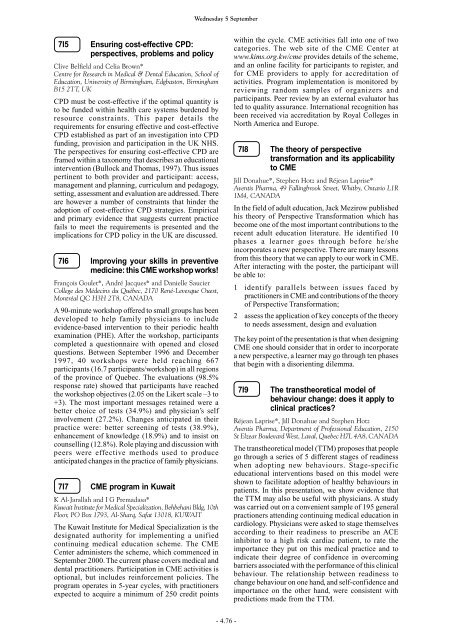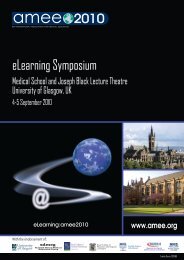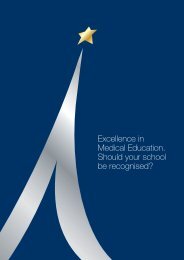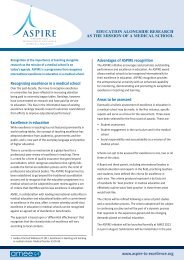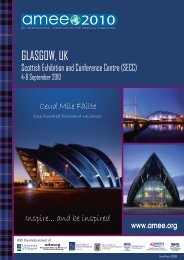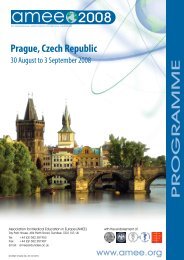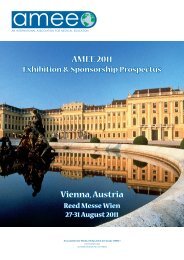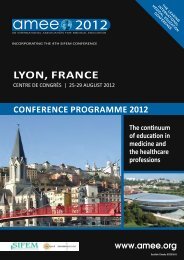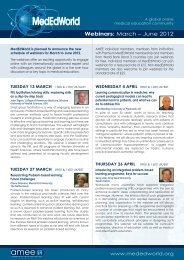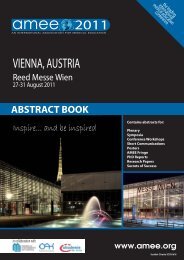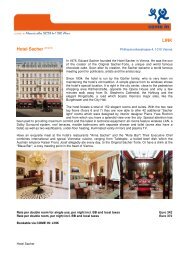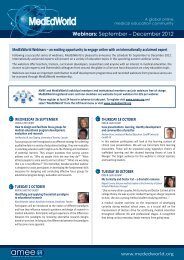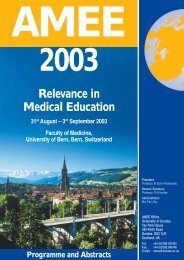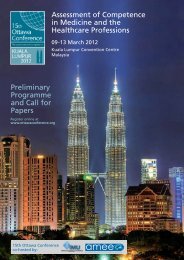AMEE Berlin 2002 Programme
AMEE Berlin 2002 Programme
AMEE Berlin 2002 Programme
You also want an ePaper? Increase the reach of your titles
YUMPU automatically turns print PDFs into web optimized ePapers that Google loves.
7I5 Ensuring cost-effective CPD:<br />
perspectives, problems and policy<br />
Clive Belfield and Celia Brown*<br />
Centre for Research in Medical & Dental Education, School of<br />
Education, University of Birmingham, Edgbaston, Birmingham<br />
B15 2TT, UK<br />
CPD must be cost-effective if the optimal quantity is<br />
to be funded within health care systems burdened by<br />
resource constraints. This paper details the<br />
requirements for ensuring effective and cost-effective<br />
CPD established as part of an investigation into CPD<br />
funding, provision and participation in the UK NHS.<br />
The perspectives for ensuring cost-effective CPD are<br />
framed within a taxonomy that describes an educational<br />
intervention (Bullock and Thomas, 1997). Thus issues<br />
pertinent to both provider and participant: access,<br />
management and planning, curriculum and pedagogy,<br />
setting, assessment and evaluation are addressed. There<br />
are however a number of constraints that hinder the<br />
adoption of cost-effective CPD strategies. Empirical<br />
and primary evidence that suggests current practice<br />
fails to meet the requirements is presented and the<br />
implications for CPD policy in the UK are discussed.<br />
7I6 Improving your skills in preventive<br />
medicine: this CME workshop works!<br />
François Goulet*, André Jacques* and Danielle Saucier<br />
College des Médecins du Québec, 2170 René-Levesque Ouest,<br />
Montréal QC H3H 2T8, CANADA<br />
A 90-minute workshop offered to small groups has been<br />
developed to help family physicians to include<br />
evidence-based intervention to their periodic health<br />
examination (PHE). After the workshop, participants<br />
completed a questionnaire with opened and closed<br />
questions. Between September 1996 and December<br />
1997, 40 workshops were held reaching 667<br />
participants (16.7 participants/workshop) in all regions<br />
of the province of Quebec. The evaluations (98.5%<br />
response rate) showed that participants have reached<br />
the workshop objectives (2.05 on the Likert scale –3 to<br />
+3). The most important messages retained were a<br />
better choice of tests (34.9%) and physician’s self<br />
involvement (27.2%). Changes anticipated in their<br />
practice were: better screening of tests (38.9%),<br />
enhancement of knowledge (18.9%) and to insist on<br />
counselling (12.8%). Role playing and discussion with<br />
peers were effective methods used to produce<br />
anticipated changes in the practice of family physicians.<br />
7I7 CME program in Kuwait<br />
K Al-Jarallah and I G Premadasa*<br />
Kuwait Institute for Medical Specialization, Behbehani Bldg, 10th<br />
Floor, PO Box 1793, Al-Sharq, Safat 13018, KUWAIT<br />
The Kuwait Institute for Medical Specialization is the<br />
designated authority for implementing a unified<br />
continuing medical education scheme. The CME<br />
Center administers the scheme, which commenced in<br />
September 2000. The current phase covers medical and<br />
dental practitioners. Participation in CME activities is<br />
optional, but includes reinforcement policies. The<br />
program operates in 5-year cycles, with practitioners<br />
expected to acquire a minimum of 250 credit points<br />
Wednesday 5 September<br />
- 4.76 -<br />
within the cycle. CME activities fall into one of two<br />
categories. The web site of the CME Center at<br />
www.kims.org.kw/cme provides details of the scheme,<br />
and an online facility for participants to register, and<br />
for CME providers to apply for accreditation of<br />
activities. Program implementation is monitored by<br />
reviewing random samples of organizers and<br />
participants. Peer review by an external evaluator has<br />
led to quality assurance. International recognition has<br />
been received via accreditation by Royal Colleges in<br />
North America and Europe.<br />
7I8 The theory of perspective<br />
transformation and its applicability<br />
to CME<br />
Jill Donahue*, Stephen Hotz and Réjean Laprise*<br />
Aventis Pharma, 49 Fallingbrook Street, Whitby, Ontario L1R<br />
1M4, CANADA<br />
In the field of adult education, Jack Mezirow published<br />
his theory of Perspective Transformation which has<br />
become one of the most important contributions to the<br />
recent adult education literature. He identified 10<br />
phases a learner goes through before he/she<br />
incorporates a new perspective. There are many lessons<br />
from this theory that we can apply to our work in CME.<br />
After interacting with the poster, the participant will<br />
be able to:<br />
1 identify parallels between issues faced by<br />
practitioners in CME and contributions of the theory<br />
of Perspective Transformation;<br />
2 assess the application of key concepts of the theory<br />
to needs assessment, design and evaluation<br />
The key point of the presentation is that when designing<br />
CME one should consider that in order to incorporate<br />
a new perspective, a learner may go through ten phases<br />
that begin with a disorienting dilemma.<br />
7I9 The transtheoretical model of<br />
behaviour change: does it apply to<br />
clinical practices?<br />
Réjean Laprise*, Jill Donahue and Stephen Hotz<br />
Aventis Pharma, Department of Professional Education, 2150<br />
St Elzear Boulevard West, Laval, Quebec H7L 4A8, CANADA<br />
The transtheoretical model (TTM) proposes that people<br />
go through a series of 5 different stages of readiness<br />
when adopting new behaviours. Stage-specific<br />
educational interventions based on this model were<br />
shown to facilitate adoption of healthy behaviours in<br />
patients. In this presentation, we show evidence that<br />
the TTM may also be useful with physicians. A study<br />
was carried out on a convenient sample of 195 general<br />
practioners attending continuing medical education in<br />
cardiology. Physicians were asked to stage themselves<br />
according to their readiness to prescribe an ACE<br />
inhibitor to a high risk cardiac patient, to rate the<br />
importance they put on this medical practice and to<br />
indicate their degree of confidence in overcoming<br />
barriers associated with the performance of this clinical<br />
behaviour. The relationship between readiness to<br />
change behaviour on one hand, and self-confidence and<br />
importance on the other hand, were consistent with<br />
predictions made from the TTM.


